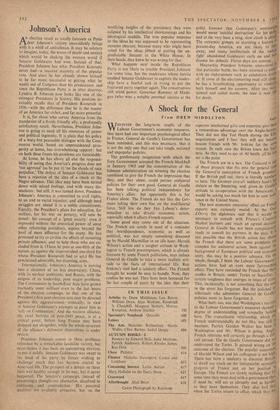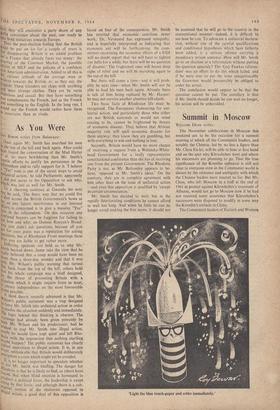A Shock for the General
From DREW
WHATEVER the long-term results of the Labour Government's economic measures, they have had one important psychological effect in France. General de Gaulle's Government has been reminded, and this was necessary, that it is not the only one that can take tough, national and unpopular policies.
The gentlemanly resignation with which the Tory Government accepted the French blackball in January 1963 and the concentration of the Johnson administration on winning the election combined to give the French the impression that they, and they alone, could pursue unilateral policies for their • own good. General de Gaulle has been talking political independence for America's allies: but apparently this is for France alone. The French do not like the Ger- mans taking their own line on the multilateral force. Still less do they like Labour's deter- mination to take drastic economic action, especially when it affects French exports.
Some good may come out of the situation. The French are sorely in need of a reminder that interdependence, economic as well as political, was not simply something dreamed up by Harold Macmillan in an idle hour. Harold Wilson's action and a tougher attitude in Wash- ington to French presumptions, which is already foreseen by some French politicians, may induce General de Gaulle to take a more realistic atti- tude to the facts of international life. Roy Jenkins's visit had a salutary effect. The French thought he would be easy to handle. Now, they confess he was not. They have been bemused for the last couple of years by the idea that their
superior intellectual gifts and expertise give ale° a tremendous advantage over the Anglo-sax0nc5' They did not like Ted Heath during the a negotiations and I fear they will not bec0n4 bosom friends with Mr. Jenkins for the soil reason. In each case the Briton knew his 11031. ness. As they used to say of Al Smith. all he On; see is the point. The French are in a box. The Concord is °11,ic of those projects that tits into the general (311', the General's) conception of French grandenr: If the British pull out, there is literally nowher` to turn. The German aircraft inthistry hasn't 11 stature or the financing, and, given de Gaulle., attitude to co-operation with the Americans. I! would be asking too much for him to seek ass1.5', I tance in the United States.
The new economic measures' effect on 1-7rene1 exports was curiously muted. At the Qtla d'Orsly the diplomats said that it would be necessary to consult with France's Commoll Market partners and reach an agreed decision. General de Gaulle has not been conspicuoul ready to consult his partners in the past. It jtth possible that the British action has stun the French that there are some problems too complex for unilateral action. Seen against th,c background of European political and econorne unity, this may be a positive advance. On llic whole, though, I think the Labour Government's actions have had an even more far-reaching. effect. They have reminded the French that there resides in Britain, under Tories or Socialists. certain toughness that emerges in times of stresi: This, incidentally, is not something that the in the street has forgotten. But the polished it!' tellectuals who administer General de Gaulle policies seem to have forgotten it. What hurt, too, was that Washington's re,v;Ii`)11 to the Labour Government's measures showed :1 degree of understanding and sympathy lacldflg here. The transatlantic relationship, which tile French understandably do not like, was still business. Patrick Gordon Walker has been It' Washington and Mr. Wilson is going. Angl°' French relations will certainly .go through a cult period. The de Gaulle Government did !IL' understand the Tories. It guessed wrong on it outcome of the election. The popular assessment of Harold Wilson and his colleagues is not higit' There has been a tendenty to discount BrilLO, to dwell too much on the indisputable econonlic progress of France and on her position , Europe. The French are slowly realising that for some time they must deal with a government th;11, if need be., will act as abruptly and as harsh as they have themselves. They also feel th3t when the Tories return to office, which they e%" 14'et, they will encounter a party shorn of any 8ttilty conscience about the past, one ready to Ike bold initiatives towards Europe. Thus the post-election feeling that the British e,ould be put on ice for a couple of years is I,asl disappearing. Britain is an added problem I°r a France that already faces too many ; the tlisarray of the Common Market, the possible Nvent of MLF and the policies of a confident new American administration. Added to all this is the curious attitude of the average man or ()rnan towards the British, or, as they say, the l'nalish. These islanders eat chips with anything 11(1 wear strange clothes. They are by turns perious and casual. But they have something that complements the French, just as the French add something to the English. In the long run, I oUld!iay the French would rather have them as associates than as rivals.

































 Previous page
Previous page